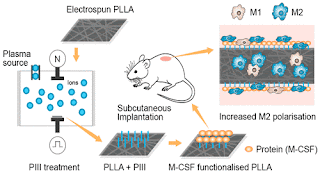Blog dedicated to answering technical questions in an open format relating to PolySciTech (A division of Akina, Inc.) products.
Tuesday, January 14, 2020
PLLA from PolySciTech used in research on controlling immune-response to implant surfaces
In many ways, the human immune system can be considered to be similar to a viscous dog on a chain. It will attack anything that gets within reach that it does not recognize as part of its owner or self. This is great when it comes to bacterial and viral infections which legitimately need to be attacked to prevent infection. This is not great when it comes to medical implants and other materials which may evoke an inflammatory response. Recently, researchers at The Heart Research Institute (Sydney, Australia) University of Sydney (Australia), Shanghai Tongji University, and Shanghai Jiaotong University School of Medicine (China) used PLLA (AP006) from PolySciTech (www.polyscitech.com) to create electrospun meshes of this polymer. They treated these meshes with M-CSF and tested the ability of this treatment to reduce the inflammation response. This research holds promise to improve the functionality of implant materials by reducing the body’s immune response against it. Read more: Yang, Nianji, Richard P. Tan, Alex HP Chan, Bob SL Lee, Miguel Santos, Juichien Hung, Yun Liao et al. "Immobilised Macrophage Colony-Stimulating Factor (M-CSF) regulates the foreign body response to implanted materials." ACS Biomaterials Science & Engineering (2020). https://pubs.acs.org/doi/abs/10.1021/acsbiomaterials.9b01887
“Abstract: The functionality and durability of implanted biomaterials are often compromised by an exaggerated foreign body reaction (FBR). M1/M2 polarization of macrophages is a critical regulator of scaffold-induced FBR. Macrophage colony-stimulating factor (M-CSF), a hematopoietic growth factor, induces macrophages into an M2-like polarized state, leading to immunoregulation and promoting tissue repair. In the present study, we explored the immunomodulatory effects of surface bound M-CSF on poly-l-lactic acid (PLLA)-induced FBR. M-CSF was immobilized on the surface of PLLA via plasma immersion ion implantation (PIII). M-CSF functionalized PLLA, PLLA-only, and PLLA+PIII were assessed in an IL-1β luciferase reporter mouse to detect real-time levels of IL-1β expression, reflecting acute inflammation in vivo. Additionally, these different treated scaffolds were implanted subcutaneously into wild-type mice to explore the effect of M-CSF in polarization of M2-like macrophages (CD68+/CD206+), related cytokines (pro-inflammatory: IL-1β, TNF and MCP-1; anti-inflammatory: IL-10 and TGF-β), and angiogenesis (CD31) by immunofluorescent staining. Our data demonstrated that IL-1β activity in M-CSF functionalized scaffolds was ∼50% reduced compared to PLLA-only at day 1 (p < 0.01) and day 2 (p < 0.05) post-implantation. There were >2.6-fold more CD206+ macrophages in M-CSF functionalized PLLA compared to PLLA-only at day 7 (p < 0.001), along with higher levels of IL-10 at both day 7 (p < 0.05) and day 14 (p < 0.01), and TGF-β at day 3 (p < 0.05), day 7 (p < 0.05), and day 14 (p < 0.001). Lower levels of pro-inflammatory cytokines were also detected in M-CSF functionalized PLLA in the early phase of the immune response compared to PLLA-only: a ∼58% decrease at day 3 in IL-1β; a ∼91% decrease at day 3 and a ∼66% decrease at day 7 in TNF; and a ∼60% decrease at day 7 in MCP-1. Moreover, enhanced angiogenesis inside and on/near the scaffold was observed in M-CSF functionalized PLLA compared to PLLA-only at day 3 (p < 0.05) and day 7 (p < 0.05), respectively. Overall, M-CSF functionalized PLLA enhanced CD206+ macrophage polarization and angiogenesis, consistent with lower levels of pro-inflammatory cytokines and higher levels of anti-inflammatory cytokines in early stages of the host response, indicating potential immunoregulatory functions on the local environment.”
--> Save-the-date: Akina, Inc's third annual Biotech-Pharma-Cancer-Research (BPCR) conference is August 26 at Kurz Purdue Technology Center (KPTC) (http://bpcrconference.com/).
Subscribe to:
Post Comments (Atom)

No comments:
Post a Comment